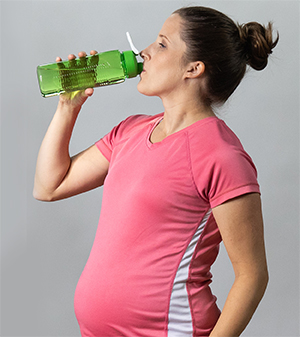Exercise can help you keep your blood sugar in a normal range. That’s because your body uses more sugar when you exercise. Diabetes in pregnancy can often be managed with careful nutrition and exercise alone. Then you may not need medicine to control your blood sugar.
Exercise regularly
Your health care provider may want you to exercise each day. The best time depends on when your blood sugar is highest. Exercising may also help ease some common symptoms of pregnancy. These include bloating, constipation, urinary incontinence, and backaches. Ask about exercise at your first prenatal care visit. Your provider will work with you to make an exercise plan that fits your needs. Here are some tips:
-
Aim to exercise for 30 to 60 minutes a day. Do this at moderate intensity. This means you're moving enough to raise your heart rate and start sweating. But you can still talk normally.
-
Try breaking up daily exercise into 2 or 3 sessions. For example, take a 15-minute walk after each meal.
-
Exercise with a friend or your partner. This may help you stick to your exercise plan.
-
Go at a comfortable pace. Don’t tire yourself out.
Exercise safely
Ask your provider about exercise safety for you and your baby. Walking, swimming, and low-impact or water aerobics are often the safest things to do. Other safety tips include:
-
Don't do activities where you jump, turn, twist, or stop and start quickly.
-
Don't lift heavy weights.
-
Don't exercise on your back after the first trimester. This can put too much pressure on an important vein. It can limit blood flow to the baby. If you do yoga or Pilates, find a class designed for pregnancy.
-
Use a sports bra to support your breasts. You may also want to use a belly support belt later in pregnancy.
-
Don't get overheated. Don't do hot yoga or hot Pilates. Don't raise your heart rate to a level that makes it hard to talk.
-
Drink plenty of water.
-
If you use insulin, carry a carbohydrate snack with you.
-
If you walk or do low-impact aerobics, wear sturdy shoes.
-
If you haven’t eaten in 2 or more hours, have a light snack before exercising.
-
Don't do contact sports that put you at risk of being hit in the belly. These include boxing, ice hockey, soccer, and basketball.
-
Don't go skydiving or scuba diving.
-
Don't do things that may cause a serious fall. These include horseback riding, gymnastics, and off-road cycling.
-
Use a stationary bike. It's a safer choice than a standard bike. It will stop you from getting off balance with your growing belly.
When it's not safe to exercise
It's not advised to exercise when pregnant if you have any of these health conditions:
-
Some types of heart and lung diseases
-
Pregnant with twins or more, and at risk for preterm labor
-
Preterm labor or if your water has broken (ruptured membranes)
-
Placenta previa later than 26 weeks of pregnancy
-
Preeclampsia or high blood pressure due to pregnancy
-
Severe anemia
-
Cervical insufficiency or cerclage
When to contact your doctor
Call your provider right away or go to the ER if:
-
You have belly pain.
-
You have vaginal bleeding.
-
You feel dizzy or faint.
-
You have a headache.
-
You notice decreased fetal movement.
-
You have preterm contractions.
-
You have muscle weakness.
-
You have calf pain or swelling.
-
There's fluid leaking from the vagina.
Call 911
Call 911 if:
-
You have chest pain.
-
You have trouble breathing.


